© Janet and Allan Ahlberg
Back in 1977, the children’s story book writers, Janet and Allan Ahlberg, wrote a lovely little story about Burglar Bill, a night time predator on his neighbours who had stolen everything he considers to be his, including his own bed. Being an Ahlberg book, of course, it all ends happily when somebody leaves him a baby and he then falls for its mother, Burglar Betty. They agree to give up stealing and raise the baby together, which they do, having given back all the many things they’d stolen. Vladimir Putin has no good intentions at all and shows no signs of giving up blatant theft, certainly not returning his ill-gotten gains. He seems to believe that anything he wants he can simply take. It’s a way of thinking more closely associated with real burglars or gangsters, who take what they can carry and damage whatever they can’t, to ensure its real owners lose the use of it anyway, as a kind of punishment for having something that can’t be carted off by the thieves. It’s not an attitude most people associate with a world leader, but Putin is, to put it bluntly, a thief. The Daoist philosopher Zhuangzi, in the 4th century BCE, once said: “steal a hook and be executed. Steal a country and become a marquis.” Almost three millennia later, Mao Zedong put it more simply: “Political power comes from the barrel of a gun.” It’s a philosophy Putin understands; he’s a crook.
It’s believed that Putin now employs a kind of specialist gang, to identify more accurately what’s worth stealing, and to smuggle those items out of Ukraine and into Russia. Russia seems to see the group as a kind of human ‘jeweller’s loupe’ magnifying glass.
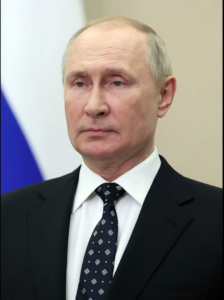
Brian Daniels, an anthropologist who works with archæologists, historians and specialists in digital imaging, is based in a laboratory in Virginia in the United States. He has been monitoring the thefts and deliberate destruction of cultural objects removed by Russians, and he says there is strong evidence that this is part of a deliberate Russian policy, with the thefts so far showing a preference for Scythian gold. Scythian gold is rare, heavy and extremely valuable. Several items made from it, including a great many animal figures and also a solid gold military helmet (at that weight it must have been hell to wear) were on display in Crimea but had been lent to a museum in Amsterdam before the Russian invasion and takeover. There is now a legal dispute as to whether it should be returned, and, if so, to whom. The Russians want it, of course, but it can hardly be returned to its original owners because they no longer exist; Crimea is supposed to be Ukrainian but currently (the Ukrainians hope temporarily) it is not. Daniels told Britain’s Observer newspaper: “These items are visually stunning, and there are now so many reports of thefts it is evident that it is a strategy.” Daniels told the newspaper that the Ukrainians are keen to set up a list of stolen objects. He’s not sure if the Russians are doing it because of the monetary value of what they’ve taken or if it’s an attempt to undermine Ukraine’s identity as a separate country by suggesting that everything of value there belongs to Russia. Burglar Bill strikes again!
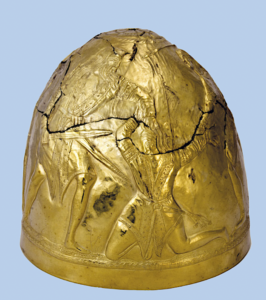
Daniels is also fearful for the welfare of museum staff who find themselves behind Russian lines. Russia has launched what is the biggest war in Europe since 1945, and it’s a war of an imperialist nature. It’s been done before: degrade your enemy, steal everything valuable and loot every museum and art gallery you can find. Museum staff are likely to be seized by Russian forces as ‘prisoners of war’. Meanwhile, Russia has widened its range of targets for theft. For instance, it has been stealing hazardous materials from a site close to the Chernobyl nuclear power plant, their soldiers using postal services in neighbouring Belarus to get some of the stolen goods home. Voice of America (VOA) has shown photographs from a nuclear laboratory which are alleged to show Russian troops stealing radioactive materials that could be extremely dangerous if mishandled. Among the stolen goods are radiation dosimeters, safety devices the size and shape of a large coin. If the Russian soldiers are carrying them around it could be dangerous for them: in direct contact with the skin they could cause radiation burns in just two minutes. Not everything the Russians have been stealing is dangerous, just expensive, such as computer servers and memory units, as well as other computer spare parts. They also took construction vehicles, trucks, excavators, crockery and even the mattresses from beds.
WE PLOUGH THE FIELDS AND PLUNDER
When I was very young there used to be an annual harvest festival, which involved singing an appropriate hymn at the daily morning school reception (a kind of semi-religious event with prayers and school announcements). The hymn most commonly used at harvest time was ‘We Plough the Fields and Scatter’. In fact, the hymn itself is German in origin, written by the poet Mathias Claudius in 1782 to a tune by Johann A. Schulz, in celebration of gathering in the crops. It became a popular hymn for children in the UK, although living in an area of heavy industry, factory chimneys and smoke, as I did, I saw relatively little of the ploughing or scattering; I enjoyed the resultant baked goods, though. The first verse, in full, goes:
“We plough the fields, and scatter the good seed on the land;
But it is fed and watered by God’s almighty hand:
He sends the snow in winter, the warmth to swell the grain,
The breezes and the sunshine, and soft refreshing rain.”

It’s quite a jolly little hymn, although it’s not a literal translation from Claudius’ original, and back in junior school we all sang along in a cheerful enough manner, expressing our gratitude for the hard work of the farmers who delve in the soil and plant the seeds, plus their efforts in gathering in the harvest. It’s hard work for them, and even we town-bred types appreciated the effort involved in gaining us our daily bread. In America it’s mainly sung to mark Thanksgiving, a state festivity held in November each year when many official offices are closed. It has rather less to do directly with the hard work of farmers in sowing and reaping. It certainly is hard work, however, and it’s not at all what Russian troops are doing in Ukraine. They’re not planting or trying to raise food crops. They’re simply stealing the agricultural machinery owned by the Ukrainian farmers and anything else that’s moveable and not nailed down upon which they can lay their hands. The words of Claudius’ hymn would have to undergo change to reflect reality: “Wir pflügen die Felder und plündern” (we plough the fields and plunder).
It’s not the worst action of the Russian troops, of course. Shelling and firing missiles at civilian apartment blocks and schools, killing children and families, abusing and murdering any enemy prisoners they can seize comes higher up the list of outrages committed by Putin’s killers. Perhaps they would prefer this version of the chorus:
“All God’s gifts we’ve stolen
Will cause you lots of grief.
We don’t mind if we shoot you
‘Coz Putin is a thief.”
The Russians’ attempts to steal the latest tractors to take home to Russia, where the technology is less advanced, have fallen foul of a device designed to encourage legitimate owners to take any that develop faults back to the manufacturer for repair. It’s a money-making scheme, of course, because farmers tend to be quite good at making faulty equipment useable, so John Deere fitted theirs with a device linked to their “Connected Support” programme.
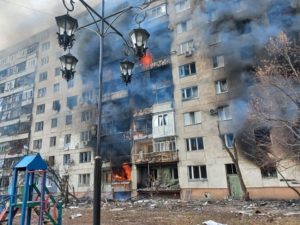
It was a very unpopular idea at the time because its aim was to discourage the repair of this costly equipment in favour of replacement.
However, in the Ukrainian city of Melitopol, some 780 kilometres from Kyiv in the south-west of the country, the Russians stole grain, tractors and harvesting machines worth some €5-million, which they loaded onto transporters to drive roughly 800 kilometres to their destination, only to find they couldn’t start them when they got there. John Deere had implemented their remote deactivation technology, using the John Deere facility which also, incidentally, identifies the location of the stolen vehicle. In this case, they had been taken to Chechnya, where the military thieves found they had been remotely deactivated. Russian soldiers have been trying, so far unsuccessfully, to bypass John Deere’s deactivation devices and get them working but may be reduced to stripping them down for spare parts that they can sell, possibly only on-line. The theft, then, would not be without gain for the thieves, but it’s clearly not what they wanted.
LEPTON LARCENY
The Russians involved seem to have acted in the main like simple vandals, without regard for their own or anyone else’s safety. The Director of the state agency that manages the exclusion zone around Chernobyl, Evgen Kramarenko, showed Voice of America (VOA) photographs he claimed had been taken on 5 April, shortly after the withdrawal of Russian forces from Chernobyl following an occupation lasting more than a month and beginning when Russia’s invasion began. Among the items taken were dosimeters, safety devices normally provided in the form of a badge which has to be calibrated using radiation dosimeters. They, in turn, are calibrated using small metallic containers of radioactive material provided by the Ukrainian state enterprise USIE Izotop, which displays a photo of them on its website. Kramarenko told VOA that most of the calibration instruments were stolen, but they would be very dangerous to any Russian soldier carrying one around. Besarab said that they look rather like coins and are therefore harmless to anyone who doesn’t know what they are. “If a person comes into direct contact with them” Besarab told VOA, “these kinds of instruments could cause radiation burns to the skin in as little as two minutes.”
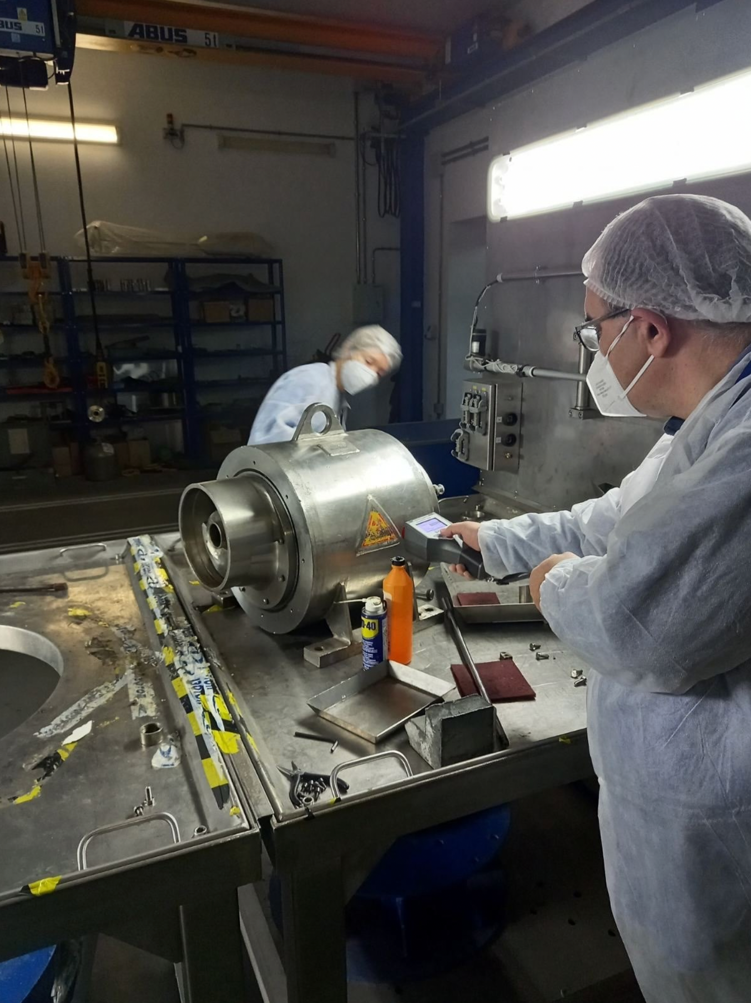
But Russian looting didn’t end there. According to Karamenko, the Russians also stole construction vehicles, including trucks and excavators, without explaining what they wanted them for. VOA also discovered that the Russians stole tableware and even mattresses. Photographs showed Russian troops who’d been pulled back to Belarus, an ally of Russia, using a Belarusian domestic delivery company, CDEK, at various times to send some of the items they’d looted in Ukraine back to private homes in Russia. Initially the footage came from CDEK’s own live-stream, but because of public outrage, the feed was taken down until after the deliveries set off. Then it was restored. The goods being sent were seen to be, in the main, mundane household goods but their transportation to addresses inside Russia seems to have been conducted with almost military precision. Among the items seen to be en route to Russia were a video card, an electric scooter, bottles of alcohol and a car battery. After the video of the thefts became public, there were calls for the Russian troops involved to be labelled “marauders” and for them to face trial. Looting has long been practised in military engagements, so we can hardly be surprised, although this appears to have been unusually blatant. And that’s not all: because of soaring electricity prices, Kosovo can no longer afford to import electricity and consumers there have been told that they will only be allowed six hours of power at a time, broken up with two-hour long breaks, according to its energy distribution company, KEDS. Again, it’s all because of Russian aggression, which risks plunging the country into shortages and freezing temperatures this winter. However, there is hope of avoiding that. According to the energy ministry in Kosovo, planned power cuts are being cancelled because Kosovo has made a deal to obtain electricity from neighbouring Albania. The only worry is that Albania relies on hydro power and with a drought at present, it may not be a long-lasting replacement.

STEALING STEEL AND EATING IT?
Russia’s looting in Ukraine is seen by other trading countries as outrageous. For example, it’s believed that Russia is stealing around €600-million of steel that – on paper, at least – is really the property of various customers around the world. The boss of Ukraine’s largest steel plant at Mariupol, which was the last to fall to a sustained attack by Russian troops, Yuriy Ryzhenkov, told the BBC that the steel was being transferred to Russia and sold on to other customers. The plant, known as Metinvest, lost some 300 employees and 200 of their relatives in the fighting, while thousands of tonnes of steel that had already been paid for is now being sold on internal markets or to client countries in Africa or Asia. “What they are doing is basically looting,” Ryzhenkov told the BBC, “They’re stealing not only our products, but also some of those products that already belong to the European customers. So basically, they’re not only stealing from us, they’re stealing from the Europeans as well.” Steel already sold to the United Kingdom was part of the shipment stolen by Russia. Ryzhenkov said that his company is documenting as much of the theft as possible with a view to taking legal action at a future date. “At some point in time, the Russians will be facing not only the international courts, but also the criminal courts. And we will be going after them with anything we have.”
To be perfectly honest, the chances of success through the courts are very slim indeed. Professor Marko Milanovich, an international law expert at the University of Reading, was not hopeful of success. “Whichever legal options Metinvest chooses,” he admitted, “it’s a very difficult process and whilst looting is unfortunately quite common in conflicts, suing the looting state and obtaining compensation is very, very rare indeed.” He is more hopeful that the symbolic value of labelling Russia a thief would be worth the bother of going through the difficult process. Of course, even if the Russians were forced to pay out compensation (they won’t be), nothing can ever compensate for the 300 brave Ukranians and their 200 relatives who died trying to defend the plant. Money, it seems, counts for more than human life in today’s mercenary world, at least to Putin’s Russia.

Stories of looting by the Russians date back to the very beginning of the invasion. Video footage posted on social media in February 2022 purport to show Russian soldiers stealing supplies from a supermarket, walking around filling the baskets without paying for anything, and another video appears to show Russian soldiers stealing a safe from a bank in the Kherson region of Ukraine. Russian soldiers are not well-supplied and neither are they well-paid nor well-fed, so looting of basic foodstuffs is, perhaps, inevitable, but it’s rather hard to eat a safe. It’s true, though, that the contents could buy food, I suppose, if there’s any left in the shops that the Russians haven’t already stolen.
There may be a day of reckoning, however unlikely that seems at present. One of Moscow’s soldiers was even recorded calling his wife and promising her that he would bring her back ‘two fur coats and a quantity of high-end kitchen appliances’ that he had stolen. It’s possible – perhaps remotely – that the thieves may one day find themselves in court because Ukrainian intelligence services have hacked the mobile phones of more than 120,000 Russian soldiers, taking a note of all they’ve boasted of having stolen. Some of the pictures have shown scenes of which the conscripts are unlikely to boast, such as young soldiers (they only earn the equivalent of around €31 a month) stealing chickens and any other edible foodstuffs. It’s not the sort of scene that would impress the girls back home. They also steal petrol and civilian vehicles.
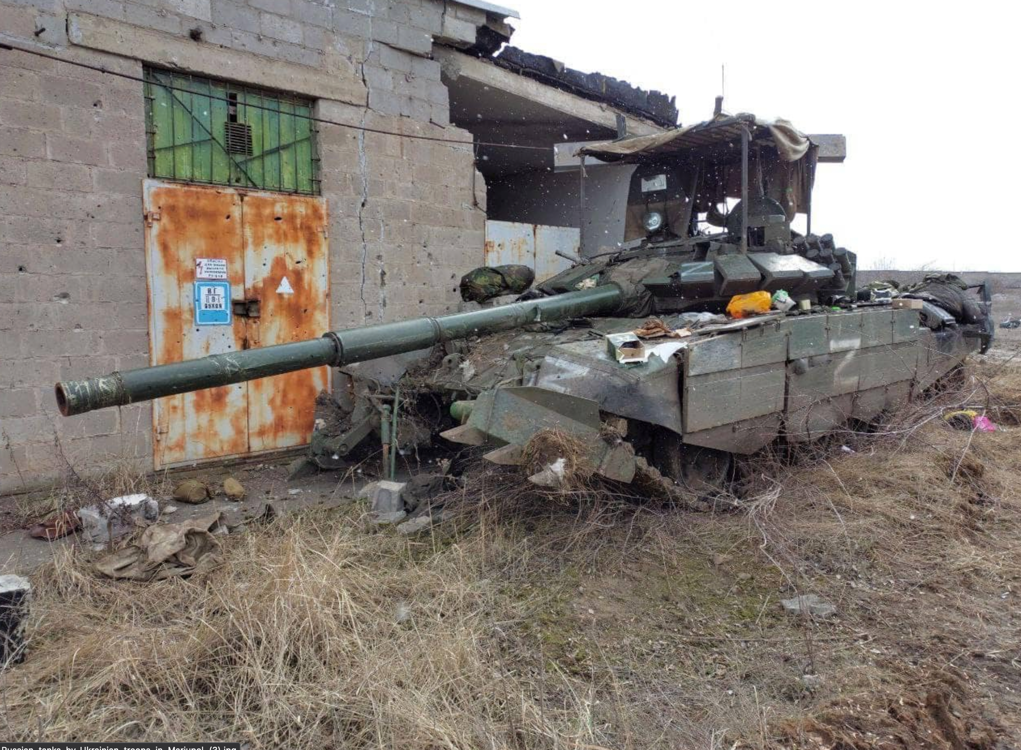
But officers have also been known, not uncommonly, to steal their men’s rations in order to sell them on or consume them themselves. The Russian troops had been assured that they’d be welcomed in Ukraine for ‘saving the country from Nazis’, but they could never find any, and they quickly discovered that they were not welcome at all, frequently being pelted with stones and with insults being shouted at them. Some of the Russian military convoys were seen to be made up of looted civilian vehicles, stolen locally. Russian military vehicles have also simply disappeared, stolen by Ukrainian civilians. This is no way to fight a war, although it’s a style of warfare that some 18th and 19th century generals would have recognised (apart from the trucks and cars, of course).
LESSONS FROM THE PAST
Some traditions of ancient warfare live on, unfortunately. Such as widespread looting of civilian homes, for instance. Following the Ukrainian victory in the Battle for Kyiv, and the subsequent Russian retreat, returning civilians have discovered their homes stripped almost bare – with everything from computers and TVs to perfume, vacuum cleaners, curtains, and even underwear missing. As the Langley Advance Times reports: “Since at least the Bronze Age if not before, the typical soldier on the march has asked himself two key questions: Is it nailed down, and can it be pried loose?” In fact, in many cases in history, the war was mainly fought for loot. “Some of the earliest epics and legends are about war as a form of organized theft,” the Langley Advance Times explains, citing the case of one particular legend. “Ireland’s The Tain is also known as The Cattle Raid of Cooley, and in The Epic of Gilgamesh, the ancient king of Uruk fought a monster to gain access to valuable cedar wood.”
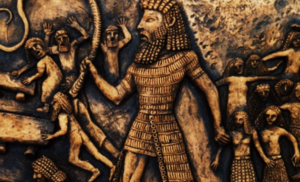
One assumes that the monster in this case was the enemy army whose valuable cedar wood it really was. According to the University of Alabama’s ‘Ancient Art’ website: “Today looting exists for many reasons, the primary reasons being a means to fund political campaigns and wars and the demand of artifacts for public and private collections. Both of these situations are fuelled completely by the high monetary value of the looted items.” In other words, an army fights a war primarily to steal enough goods to fund the next war. We’ve tended to forget this since the late 18th century, but it’s still true, especially, it seems, in cash-strapped and amoral Russia. These days, looting is banned under UN law and is regarded as a war crime, but it goes on and has hardly diminished. The goods that count as looting can be regarded as booty, plunder, the spoils of war, or pillage. In ancient times, they often included the defeated peoples, taken as slaves, or their wives, taken as concubines, and their children, the males of whom often became eunuchs. Nobody sensible ever said war was nice. Showing off your captured wealth was considered normal. Genghis Khan once stated that his greatest happiness was: “to scatter your enemy and drive him before you; to see his cities reduced to ashes. To see those who love him shrouded and in tears. And to gather to your bosom his wives and daughters.” I wouldn’t mind betting that of that list of benefits he foresees it’s the last one that appealed most strongly to him.
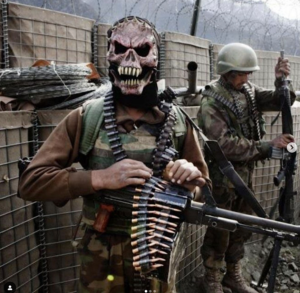
Shakespeare mentions looting, too, albeit in a roundabout way, thus proving it was common practice in the 16th century, when he was writing. In Henry V, for instance, one of the comic characters, Bardolph, is sentenced to death for stealing a religious necklace, called a ‘pax’, designed for its wearer to kiss as a sign of devotion. Another of the comic characters, ‘Aunchient’ (Ancient) Pistol, pleads for his life, arguing that the item stolen was of too little worth to merit execution. Another character, Fluellen, disagrees, saying:
(if) “he were my brother, I would
desire the duke to use his good pleasure, and put
him to execution; for discipline ought to be used.”
What he would say about the theft of high-tech agricultural machinery we can only guess at, but clearly Putin and his officers see no sin in purloining the wealth of one’s enemies along with things belonging to their friends and allies; discipline against looting, urged by Shakespeare, doesn’t matter a jot to Putin, other than to tell his troops to steal more and of ever-greater value. From being president of a large and important country, Putin has turned himself into a Mafia don, counting the loot he’s amassed through outright theft like a common criminal.
Putin changes his point of view according to the audience he’s addressing. He makes few foreign visits these days because most countries wouldn’t welcome him and fear that showing friendship towards him might damage their own standing in the world. On his visit to Tehran, for instance, he talked up Russia’s importance in resolving the crisis in Syria. On a visit to Iraq, he said that: “The Syrian crisis can only be resolved by political and diplomatic means, by strictly adhering to the basic principles of the respect of sovereignty, independence, unity and territorial integrity.”

This hardly sounds like justification for his all-out assault on Ukraine. Syria, however, has a pro-Russian president, Bashar al-Assad, while in Iran, the country’s Supreme Leader, Ali Khamenei, is one of the few who has backed Putin’s invasion of Ukraine, arguing that without it NATO would have shown no restraint in seeking to spread its influence. Khamenei said that if NATO’s expansion hadn’t been halted there, the West would have used Crimea as an excuse to start a war somewhere else.
The support of Bashar al-Assad and Khamenei for Putin’s acts of theft, however, is a serious deviation from the teachings in the Qur’an. Islam mentions what is called hudood (the plural of hadd) as the limits set by Allah beyond which a true Muslim should not go. Those who overstep the limits can expect to be punished, although the actual punishments are not specified. However, in some versions the hadd punishment for theft is the amputation of a hand. To be guilty of theft, “one must be a competent adult and have the mental intention to steal”, according to the True Islam website. Putin qualifies on both counts, of course. The site actually does a very good job of explaining what are strict rules and what are just a set of guidelines. As for explaining theft, “The act must consist of the removal by stealth of a certain kind of item of a minimum value that is owned by another person,” the site says.

How Khamenei squares his support for Russian looting with his conscience is his affair. According to the Qur’an, (5:38) “[As for] the thief, the male and the female, amputate their hands in recompense for what they earned [i.e. committed] as a deterrent [punishment] from Allah. And Allah is Exalted in Might and Wise.” That might seem like an extreme punishment for Putin, but if he seeks closer relations with Islamic leaders, shouldn’t he also observe Islamic laws? And his troops have done worse to Ukrainian civilians. But on the Islamweb.net website, a theft meriting amputation should have been done in a sneaky way and the owner must have asked for it back. In the smoke of war, perhaps the real owners forgot or were afraid to ask the Russians to return the stolen items. In any case, back in the days of the crusades, the “holy wars” between Christians and Muslims, looting was standard practice. In 1429, some 18,000 Islamic soldiers attacked Malta, looting any towns they came across, while 3,000 Maltese civilians were taken as prisoners into a life of slavery, even though the Saracen invasion was ultimately unsuccessful. Perhaps they didn’t believe the rules of hudood applied to them.
RING OUT THE BIG GUNS
The scholar and military historian Lucian Staiano-Daniels has written that Russia did not want to fight the war in the way it has been compelled to do, albeit through its own ineptitude. Putin clearly believed, following his virtually unopposed seizure of Crimea, that his forces could make a simple dash to grab Kyiv and that would be the end. His soldiers were told that they’d be welcomed for “rescuing” the citizens from a brutal Nazi regime, even though such a government didn’t exist. Instead of the knock-down walkover Putin had expected, he found citizens standing up to him, even throwing themselves under the wheels of the Russian armoured columns to slow their progress.

The Russian troops were forced to fall back on sieges of such cities as Mariupol in the east of the country. Alongside this tactic, Staiano-Daniels points out that Russia has resorted to a style of fighting Russia has used for centuries: pounding cities with massed heavy artillery. Such weapons have been popular among Russian generals since the 18th century, when Russian Field Marshal Peter Ivanovich Shuvalov developed various types of new cannon that allowed him to outgun rivals such as Prussia, while regulations adopted during the reign of Elizabeth Petrovna, Staiano-Daniels says, recommended concentrating them in combinations of 16 or even 24: a wall of explosive fire against the enemy.
Russia was accused of failing to modernise its artillery sufficiently after achieving what Staiano-Daniels calls “technological and theoretical” excellence during the first half of the 19th century, but it remained creative in its use of big guns. Staiano-Daniels writes on the Foreign Policy website that Russians seem to have a genuine affection for, even, perhaps, a devotion to their artillery, and there’s a reason for that. After Russia lost a battle at Narva, in what is now Estonia, when a Swedish relief army under Charles XII of Sweden defeated a Russian siege force three to four times its size, such was the shame in Russian eyes that the late-17th century Czar, Peter the Great, ordered every church in the country to give up some of their bells to be melted down and cast into cannon, which are made using similar techniques and often in the same workshops. This was to replace those the Swedes had successfully seized, and that is why, Staiano-Daniels suggests, Russian cannon crews accord a special status to their guns and defend them to the death, as if they were holy relics. Perhaps they were once.
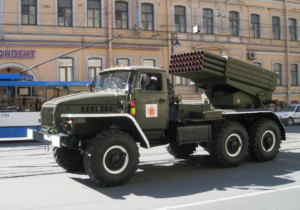
In any case, the love for artillery lives on; the Red Army was built around the artillery it used during the Second World War. The historian Antony Beevor has argued that invasions over many centuries have convinced the Russians that they’re surrounded by enemies and the victory over Hitler has changed the meaning of the word “Nazi” in Russian minds (they generally take all the credit for defeating Hitler). Now ‘Nazi’ simply means “opponent of Russia”. On that definition, perhaps Putin was justified (in a way) in describing Ukraine as being “full of Nazis”; most of its citizens have no time for Putin nor for his autocratic government. In more recent conflicts, Russia has again relied on heavy artillery. That’s why it shelled Grozny in 1999 and Aleppo in 2016. Beevor points out that it proves that Russian military tactics haven’t advanced: between 2000 and 2016, Russia used its artillery at the heart of its approach to the Chechen wars, the war in Syria and in earlier Ukrainian wars. Staiano-Daniels believes it’s because of Moscow’s unwillingness to invest in manpower; it was the same in the 18th and 19th centuries: if you don’t have enough soldiers you’ll need more big guns. They are also investing too little in replacing or refurbishing their much-loved artillery, so as the big guns wear out, Russian manufacturing facilities are not well-equipped to replace them. And with firing some 50,000 rounds a day they will wear out. NATO analysts estimate that every Russian gun that fails through over-use is one fewer for Russia to field in battle. It won’t be replaced. The Russian forces are known to have used Soviet-era weapons in their current war but they seem not yet to have succeeded in acquiring large-scale Western weaponry.
What they have acquired is a reputation for subhuman barbarism and cruelty, in one recent incident castrating a Ukrainian prisoner of war with a box cutter, filming it and then posting the video on-line. The perpetrators are also believed to have telephoned the victim’s wife to tell her what they had done, for no reason other than to cause despair and despondency by drawing her attention to the video. These are clearly not the actions of civilised human beings. The video footage was taken down, and so was a still photograph posted to replace it. The perpetrator is thought to be a 39-year-old fighter with the pro-Putin Luhansk armed group known as Bryanka-SSSR, whose members have been pictured giving Nazi salutes, which is strange considering that Putin said they were going to Ukraine to fight against Nazis.
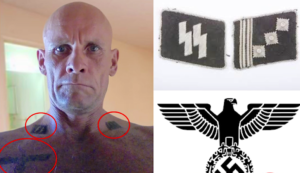
The fact is that it no longer has anything at all to do with normal politics and everything to do with Putin’s determination to be the biggest fish in the pond, however many millions he has to kill to achieve that aim. The castration, carried out while the victim was held face down, with his attackers then holding his severed genitals up to the camera, is believed to have been the most brutal so far uncovered, although the vicious mistreatment of prisoners and other war crimes are something for which Russia, and especially the Bryanka-SSR group, is well known. Britain’s Daily Mail reports that “the battalion commander, Dmitry Pindyurin nicknamed ‘Lyuty’ (‘Ferocious’), was implicated in shootings, looting, extortion and other criminal acts that terrorised the separatist region in 2015. The bodies of 17 victims were discovered in the city of Bryanka, near Alchevsk in the Lugansk region, believed to have been killed by members of the Bryanka-USSR group.” So, not only torture and murder but more lootings, too, although it’s the group’s sheer brutality that will be most remembered, and with loathing. No bravery medals for that bunch!
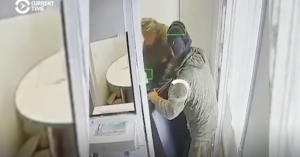
Russian forces seem keen on stealing and Putin tells them it’s OK, apparently. He also tells them what to steal. Whatever wealth Ukraine may have should be Russia’s, they’re told. A country’s heritage is its own and nobody else’s and, although I’m British, I firmly believe that the Elgin Marbles should be returned to Greece. British troops stole them and it’s well past time to give them back. But back to the looting in Ukraine. As Russia’s invasion began, the director of the Museum of Local History in Melitopol in the south-east of the country, Leila Ibrahimova, arranged for a hoard of gold artefacts from ancient Scythia to be hidden. Just a few weeks later, she was kidnapped and interrogated by Russian troops. They demanded to know where the Scythian gold was but she refused to tell them. The museum’s curator, Galina Andriivna Kucher, was then taken at gunpoint to the museum and asked to show a Russian “expert” and various agents where the gold was. She also refused to provide the information. Shortly afterwards, on 30 April, Kucher was abducted from her home and her whereabouts remain unknown.
The Russian forces don’t just steal; they insist on their right to take whatever they and their larcenous boss, Putin, say they want. As for the gold artifacts, they surfaced again after being found crated in a cellar and were taken to Donetsk in the Russian-controlled Donbas region. The new director, a Moscow ‘plant’ called Evgeny Gorlachev, said it was for their “safety” and that the artifacts themselves were not just for the Ukrainians but, as he put it, “of great cultural value for the entire former Soviet Union”. I’m not sure Lenin would have liked seeing robbery disguised as respect for Soviet values. It’s strange for today’s Kremlin to express much interest in the history of the Soviet Union. Putin is certainly no Vladimir Lenin but perhaps bears a passing resemblance at times to Joseph Stalin. He certainly shares the brutality and sheer cruel barbarism, and, like Stalin, seems to lack any sort of morals. Perhaps he, like Peter the Great, loves cannon; he certainly shares a fascination with artillery. If that is the case, Russia deserves a leader of much better calibre.

